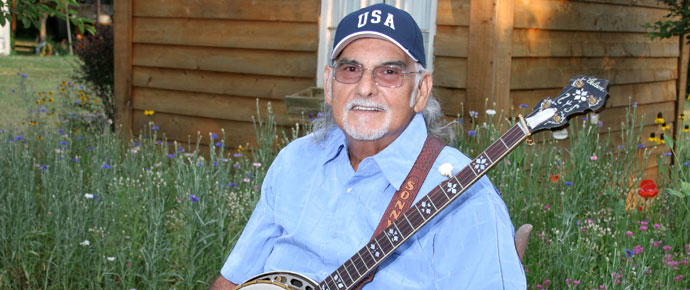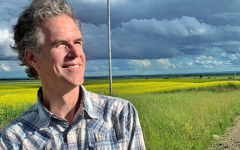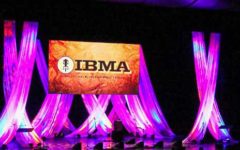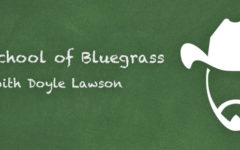
Sonny:
I once joined a bluegrass band to play mandolin and sing tenor. Not longer after I joined, the bass player quit, so I took over that job. Having never played the bass before, I got an electric bass guitar. At that time, both Jim & Jesse and the Osborne Brothers were using electric bass guitars. I figured if electric bass was good enough for these first-generation legends, it was good enough for me. I took some flack for that and was once reprimanded for playing electric bass at a SPBGMA festival. I have a SPBGMA sticker on my Fender bass case to this day. Did the Osborne Brothers ever get any complaints about using an electric bass?
Orin Friesen
Orin, thank you for your time and participation. It is appreciated and I’m happy to hear from you. It’s been a long time and I hope you’re well.
In answer to your question, Bill Monroe wouldn’t hire us at Bean Blossom because we had an electric bass. And my answer to Bill was that we were thinking about having a festival and we wanted to hire him without his mandolin pick. And his answer was the infamous “that ain’t no part of nothin'” and it was! Because our bass amp and electric bass were as much a part of our sound as anything else you could point to.
(I was there the first time Bill Monroe ever said that expression. It was in Alexandria, Virginia, and the crowd was shouting out requests. Someone asked for Take Me Back to Tulsa and Bill turned to Kenny Baker and asked “do you know that number.” He said, “no, I don’t,” and Bill kind of stuttered and said, “well, that ain’t no part of nothin’!”)
S
—–
Sonny, thank you so much for answering my question a few weeks ago (regarding Buck Owens and other country artists attempting bluegrass). As you said, a background in country music doesn’t prepare you to make bluegrass. So my question today is the reverse: do you feel like a bluegrass background is beneficial to an artist attempting to cross over to country (I mean in an artistic sense, not necessarily a commercial one). Ricky Skaggs, Marty Stuart, and Vince Gill are clearly better musicians than the average country singers of their eras, and all of them as well as the late Keith Whitley and even Chris Stapleton today have largely steered clear of the quest for pop crossover success and sold out arena shows that seems to plague many in the country field. Do you attribute some of that to them beginning their careers in the bluegrass world?
On a different note, what are your thoughts on Dave Evans as a banjo player, and do you have any stories about him?
Thanks again and God bless,
Adam
Adam, I appreciate your time and participation.
I’m not sure I can answer these questions appropriately. I can mention several who were born within a bluegrass music environment – Paul Brewster and Larry Sparks – they both could have made it as a country act if they had used the right instrumentation as well as the correct songs. Larry Sparks is my favorite singer. I frankly can’t see Flatt and Scruggs, Don and Red, or anyone else who was a big name in bluegrass making it as a country band. I really can’t. And actually I should include us in that, because we sold a lot of records with steel, piano, drums, electric guitar, and those players were Nashville’s A-Team and so we had the best Nashville had to offer.
I thought we had great songs and we were considered country because in 1971, we won the Country Music Association’s Vocal Group of the Year. And my dad always said, “bragging isn’t bragging if you can back it up.” And it would be impossible to be raised in a more bluegrass home than we were, and we sold strongly to a country audience…21 songs on the national charts. Case closed!
I don’t have any stories about Dave Evans and I don’t have an opinion of him as a banjo player.
S
—–
I was listening to an old record of Wynn Osborne and the Bluegrass Playboys and noticed the tone he pulled on Flint Hill Special and Dear Old Dixie and wondered, if he was playing your Granada on that album. It was great when he filled in with you guys in the ’80s and he could pick up where you left off on stuff.
Wes V
Wes (has to be Vanderpool)… I’m glad to hear from you. And yes, Wynn played my Granada on that whole album and it shows. As a teenager, I thought Wynn would develop into maybe the best banjo player out there. One night at the Opry, Bobby asked me if Wynn could play Foggy Mountain Breakdown on our portion of the show. Wynn was about 13. And I said sure, go ahead. That kid stepped up to the mic with an RB-100 Gibson and played the mortal hell out of Foggy Mountain Breakdown and he never missed a lick. And he accomplished in two and a half minutes what I couldn’t accomplish in a lifetime at the Grand Ole Opry. For some reason, I could never play well in that building or on that show. I never was happy with anything I did on the Opry. Of course, take into consideration the sound coming from the Opry was never what you would call really good and it still isn’t. Of course nowadays, it is not the same Opry that I knew in the ’60s and ’70s. Krako must have been staked out! I bet he did, really.
S
—–
Hello Sonny, thank you for this forum. It brings back a lot of fond memories, which leads me to my question. My first exposure to live bluegrass occurred in the 1970s when I was a banjo-obsessed teenager living in Atlanta. I had not been born into the world of bluegrass and it was something I had to seek out. Before I could drive I would go to Shoal Creek Park in Lavonia, GA with my parents. I was instantly hooked. It was the first time I saw you play, and, well, you know the lineup at that festival in those days. That was also the first time I saw Bill Monroe play, and those late night sets seared my brain forever. I don’t think it’s time that has magnified my memories, but it does seem like that festival had moments that were hard to find later. My question is: Can you share your special memories of the Lavonia festival, and its role in live bluegrass at the time? My view of that festival was as a young spectator, so I would like to hear your behind the scenes experiences. Thank you very much.
Karl R.
Karl, thank you for joining our chaotic free-for-all. Sometimes it does seem like that, but it’s always appreciated.
Shoal Creek Park had to be the hottest venue ever created. I swear, I saw Mac Wiseman just crumble there once when he weighed 400 pounds. While Shoal Creek was a good outlet for bluegrass music, the sound was always good and we always got paid. One sour note that clouds my memory comes from PBS – one Sunday or it might have been Saturday, they were determined to film us and I said no, but their determination showed its ugly face in the form of a remote control television camera. It was set up 30 feet in front of me on stage, and every time I’d look up, that camera was pointed in a different direction with no one behind it operating it. And so right in the middle of the one song, I just stopped and asked our band to have a seat on a bunch of hay bales they had placed on the stage. And I said in the mic “until that camera is pointed down to the ground, I’m not going to play another note.” And the guy who was running the camera went berserk. “I’ve got to get this done!” he said. I said, “Not today you don’t! I told you beforehand no! In this case your determination has failed you miserably, because it was in my contract that I don’t have to allow you to film us.”
We ran into this situation several times but our record contract and our agency contract didn’t allow us to be filmed. And that’s the truth.
I may have retold the previous story, and for that I apologize, but I figure it’s worth retelling, and I figure the guy might remember the two words I told him. The crowd probably remembers too.
S
=====================
Dictation – Sonny Osborne
Typist – Aynsley Porchak
Question coordinator – Lincoln Hensley
Kibitzing – Pepper and Judy Osborne
If you have something you would like to ask Sonny, be sure to post it in the comments below, or send it to us directly.







